Tottenham in Purple & Gold
A deep dive into the ENIC Out movement
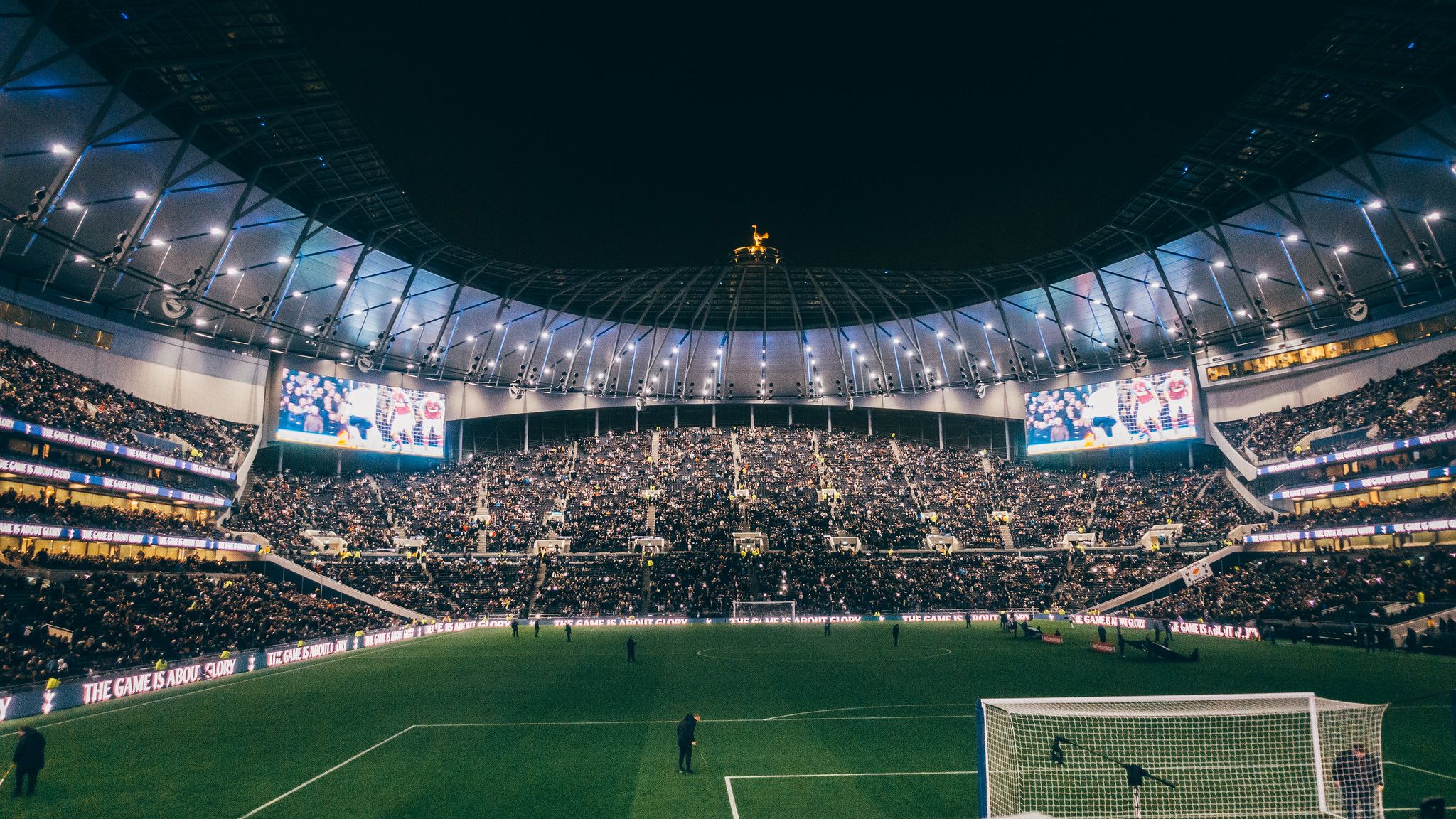
As Yoane Wissa wheeled away after scoring Brentford’s third and final goal at the Tottenham Hotspur Stadium, chants of “Daniel Levy get out of our club” rang throughout N17.
For over two decades, the ENIC Out movement, as it has been dubbed online, existed solely in digital spaces; Reddit forums, Twitter and Facebook.
But this year, that changed.
For the final five home games of the 2022/23 season, an ever-growing collection of disgruntled and at times aggressive fans gathered outside of the stadium waving purple and gold flags, demanding ENIC sell its 85% stake in Tottenham Hotspur.
These campaigners spilt into stadiums, both home and away, chanting and demanding the removal of Tottenham Chairman Daniel Levy and his employers at ENIC.
But what is it these fans actually want for the future of Tottenham Hotspur?
Who do they feel would be best placed to replace ENIC as owners? Is this a mass movement in the making or a vocal minority?
And perhaps most seriously of all, what of the more reactionary elements of this movement? Individuals who have been accused of anti-Semitism directed toward the club's ownership.
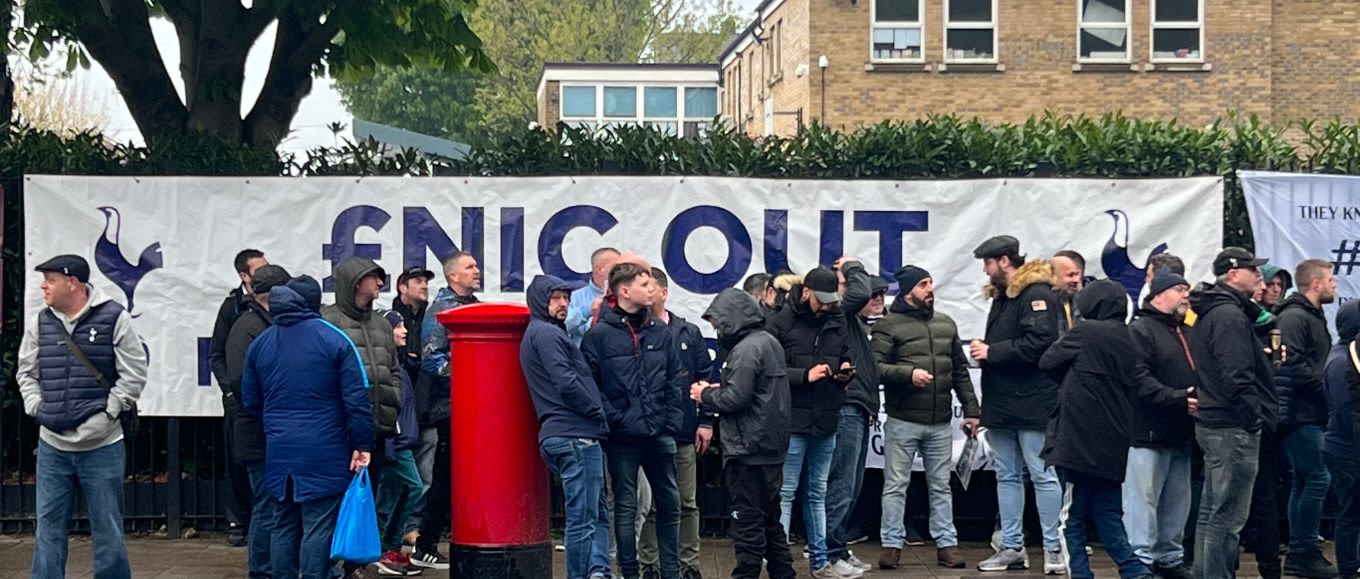

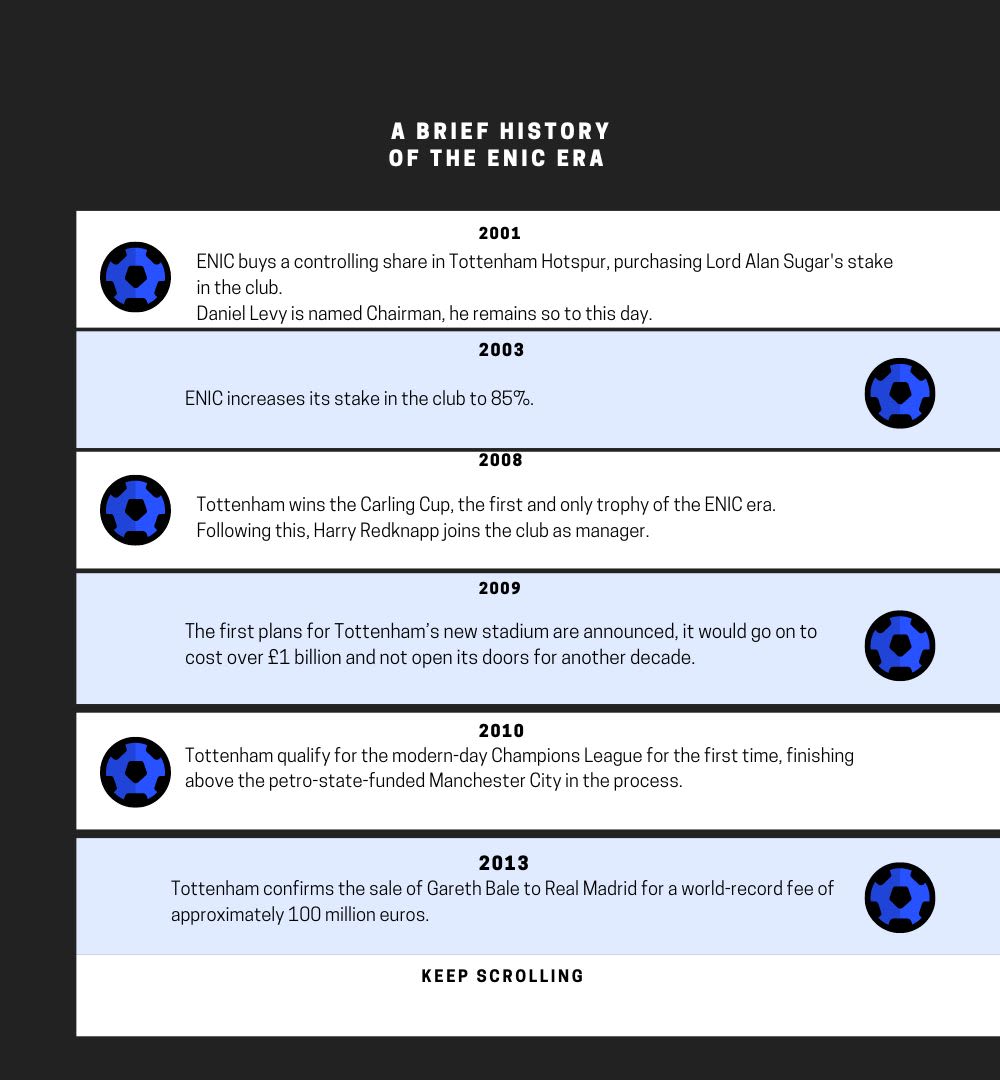
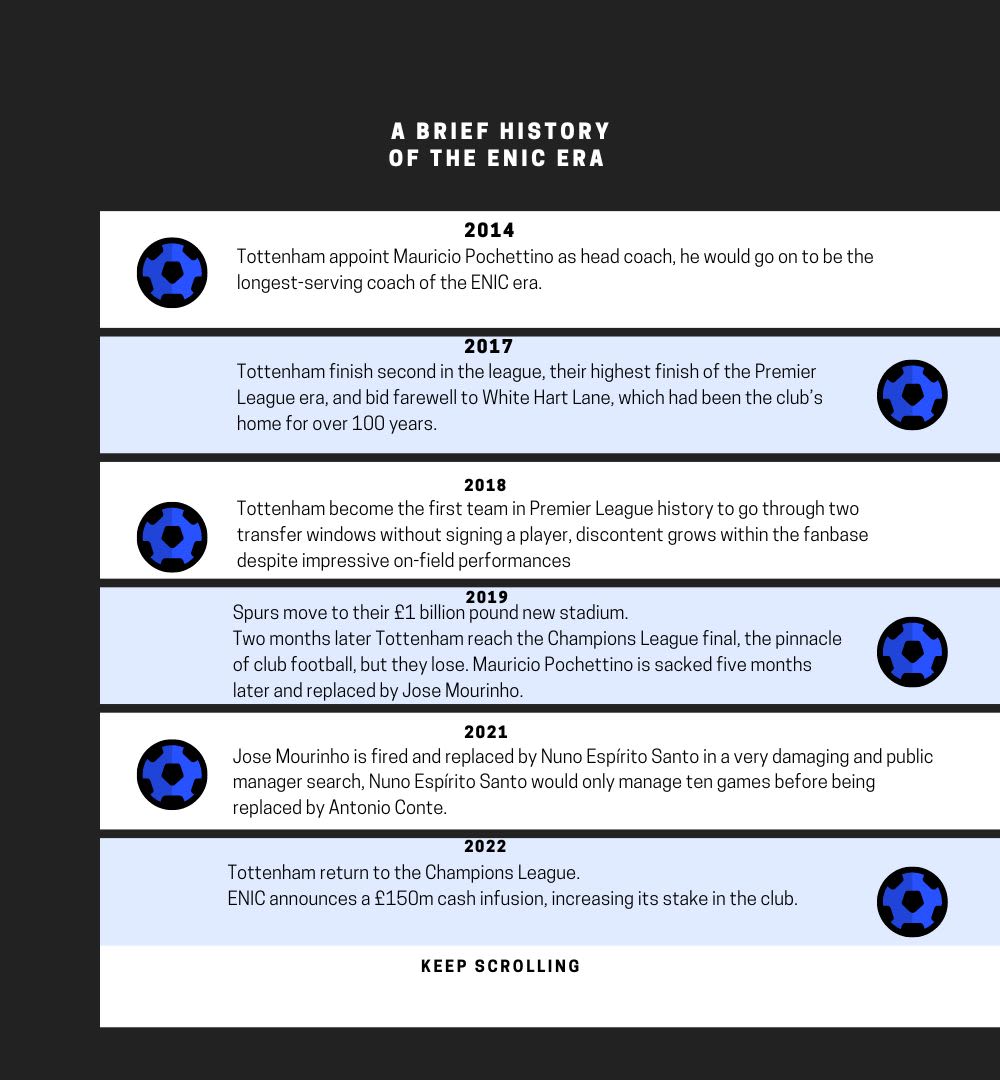
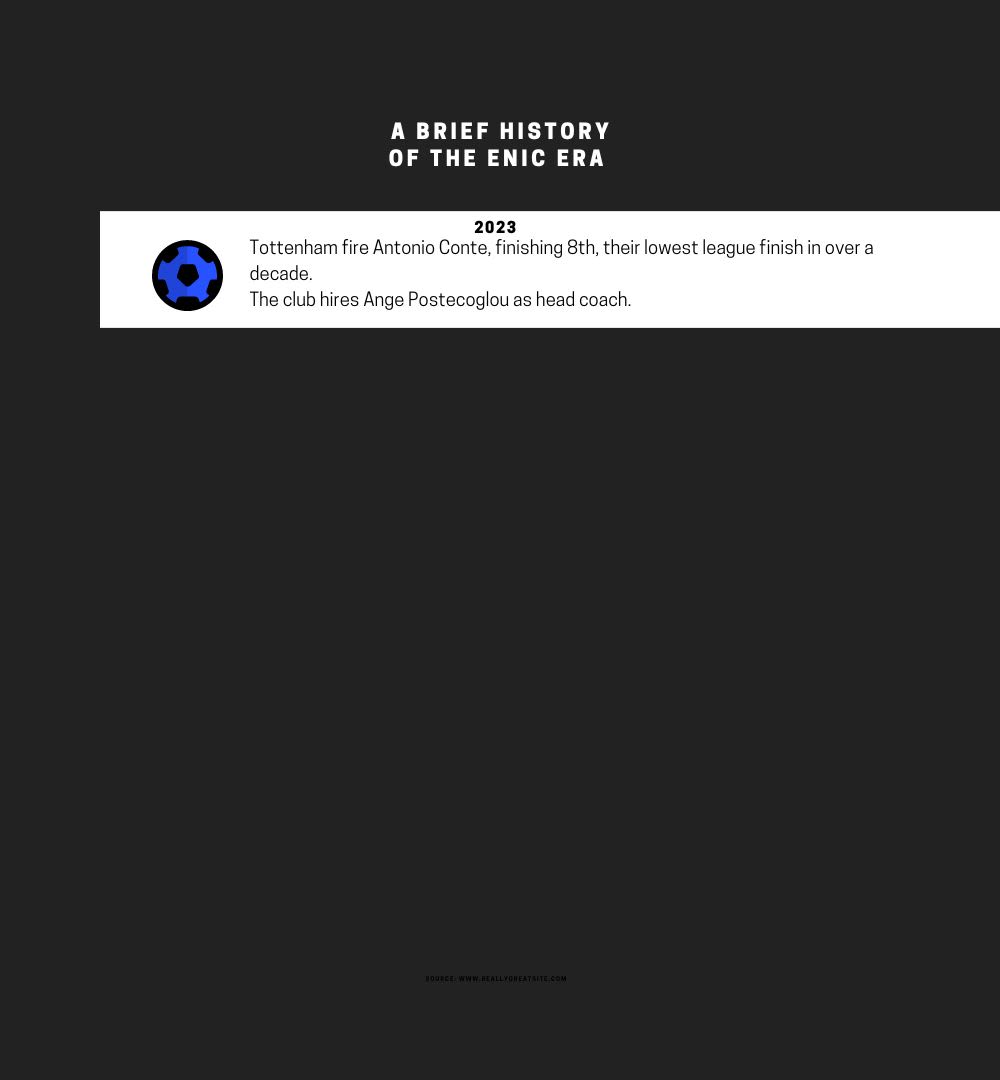
A Brief History Of The ENIC Era
ENIC first became involved in Tottenham Hotspur in 2001, when the British investment firm purchased a controlling stake in the club from Lord Alan Sugar.
Daniel Levy would be named Chairman during the purchase and remains so to this day.
It is fair to say the first decade of ENIC ownership was marked by steady progress.
Financial and on-pitch progress had been evident and by 2010, Spurs had qualified for the Champions League and won the League Cup.
The second decade of ENIC ownership is harder to define, but one figure stands at the centre of it all.
Mauricio Pochettino would take over a stuttering Spurs team in 2014 and transform a side of perennial almost-rans into bonafide challengers.
For the first time in 15 years of ENIC ownership, Tottenham would genuinely compete for the highest honours in football, finishing second in the league.
Pochettino would also oversee the team's transition from White Hart Lane to the billion-pound Tottenham Hotspur Stadium, a move that would see investment in the club's playing staff fall to almost zero for two years.
Indeed, the summer of 2018 is perhaps when the ENIC Out movement gained its first real momentum, as Spurs became the first Premier League team to go through two transfer windows without signing a single player.
Despite this lack of investment from the boardroom, Pochettino would maintain steady on-field progress, reaching the Champions League final in 2019.
This would soon come crashing down. A combination of Pochettino's own stubbornness in regard to transfer targets and a lack of investment from the board would see the Argentine sacked just five months after the final.
The years that followed would see an undeniable increase in investment from the club, but on-field performances would collapse as a result of a series of managerial appointments that clashed with the ethos Pochettino put in place during his tenure.
In 2023, Tottenham finished eighth in the Premier League, their lowest in almost two decades of ENIC ownership.
The Movement
Understanding ENIC Out
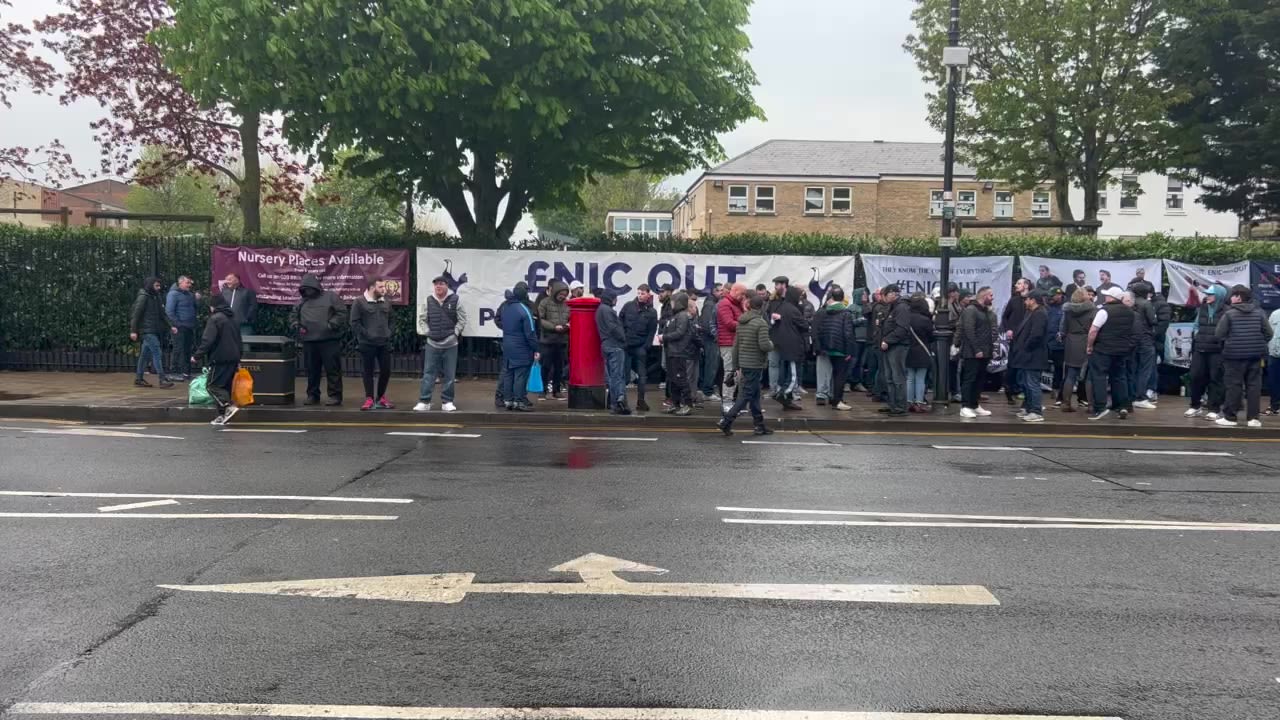
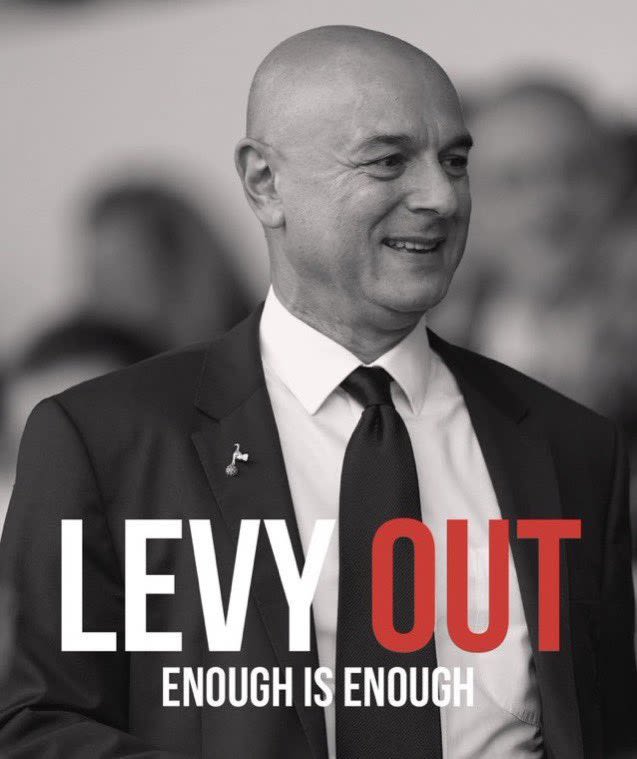
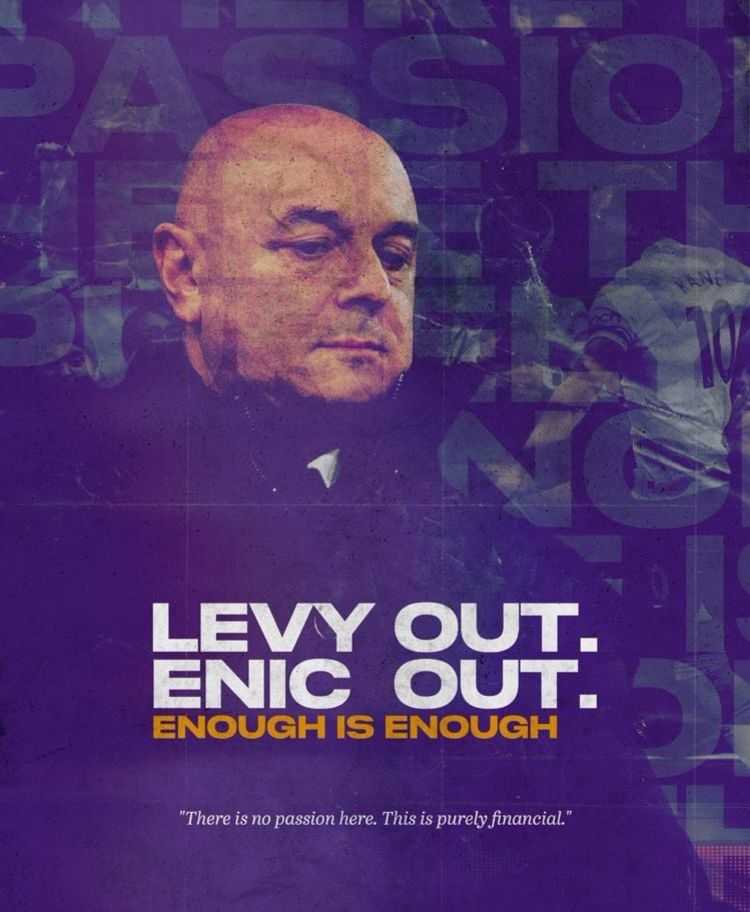
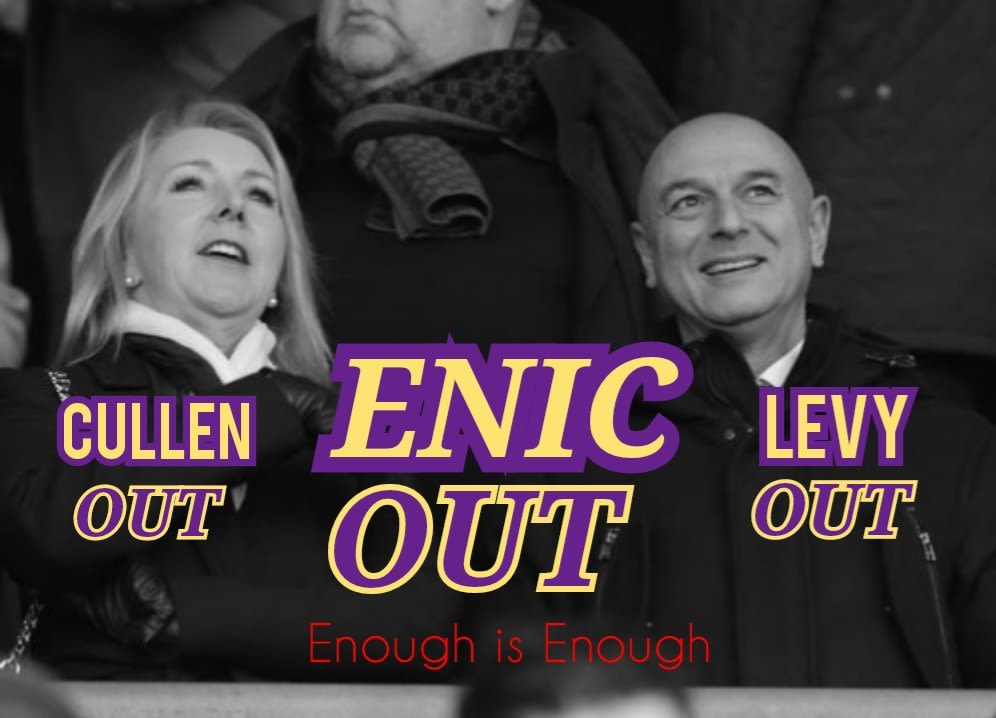
Prior to the 2022/23 season, the ENIC Out movement had existed purely in digital spaces.
Regular match-going fans would, of course, hear individual complaints about the club's ownership when the team was failing to perform on the pitch.
But not until this year did the atmosphere of discontent that has existed in the more reactionary corners of social media manifest at the stadium in the form of protests and chants from fans.
This is reflected in the rise of Change For Tottenham (CFT), which, with its Twitter 7,000+ followers, states on its official website: “Our goal is to unite fans and bring about real change at Tottenham Hotspur Football Club.”
CFT would arise in late 2022 and go on to organise several protests, boycotts and social media campaigns.
But what is the cause of this?
Perhaps it is as simple as fans being unhappy with the club's on-field performance.
Tottenham Hotspur failed to perform on the pitch in the 22/23 season, stoking anger amongst the fanbase and pushing supporters who had previously been neutral on the club's ownership into supporting the ENIC Out movement.
This is reflected in the Twitter hashtag #EnoughIsEnough, which regularly trends after Spurs lose matches.
Indeed, podcast host and Tottenham fan Chris Miller sees this as the most likely reason for the explosion in ENIC Out sentiment over the last twelve months.
He told us: "The chants against Daniel Levy in the stadium are no doubt gaining traction, and to me are more significant than the protests outside the stadium, but I think it is massively influenced by what is happening on the pitch.
"So it is more of a mechanism for fans to voice their displeasure with the team than a genuine protest movement."
However, according to CFT, the issues at Spurs run far deeper than on-field results.
According to CFT, which is the largest group pushing for a change of ownership, ENIC must answer several questions if it wants to gain fans’ trust.
This has been laid out in a manifesto of sorts by the group, titled “CFT Letter to the Tottenham Board of Directors.”
In this letter, CFT sets out several points including but not limited to:
- “The frequent chopping and changing of managers (we will make our 18th appointment, including interim managers in 22 years)”
- “The uncertainty surrounding the now vacant DoF position.”
- "The recruitment issue – with a significant number of players on loan, star players coming to the end of their contracts and a bloated squad of players.”
To delve deeper into what pushes fans to take direct action against the club they support, which takes up so much of their everyday lives, we attended a CFT protest and spoke with several fans.
The group of 100 or so men stood outside the club's official store in the buildup to Tottenham's game versus Manchester United.
Only four days after the team had been on the wrong end of a 6-1 drubbing by Newcastle United, the atmosphere in N17 was anything but relaxed.
One fan, dubbed by match-going supporters as the Spurs Rabbi told us ENIC had cultivated a toxic atmosphere over its two-decade tenure.
Tottenham fans gather outside the stadium to protest the club's ownership
Tottenham fans gather outside the stadium to protest the club's ownership
He said: "There ain't nothing they could do to change my mind, nothing.
"This is a toxic stadium, a toxic stadium," he added.
Another protester, 54, bemoaned a lack of investment from ENIC in the club and accused the firm of extracting wealth from both supporters and the club's assets.
“There has been a scattershot approach,” the protester, who refused to be named, told us.
“Penny pinching and no long-term planning to speak of whatsoever.”
A fourth protestor used the term "parasite" to describe Daniel Levy, the use of this coded, anti-Semitic language will be scrutinised later in the piece.
The phrase used most often, both in our conversations and in chants was "we want our Tottenham back."
A final fan, who was not attending the protest but the match itself, understood the movement's aims but felt uncomfortable associating with it.
Stephen,32, told us: “A different ownership model is needed for European football. One that focuses in on a vision and communicates that vision with coaches, players, and most importantly, fans. To say that ENIC is bad at communicating with fans would be gross negligence. They are downright incompetent at it.
“The way they make club statements is terrible, their fan-facing parts of the club are terrible, including their social media.”
“The way they operate is as if the club is a business venture and not something that has real-life implications for millions of people worldwide and especially the thousands that live in Tottenham proper.”
Despite this anti-ownership sentiment, Stephen felt he could not associate with the ENIC movement that has arisen on social media and spilt into the stadium.
“I disagree with it and think it’s a waste of time,” he said.
“If you want to show your discontent with ownership there are so many better ways, so far the closest thing to a manifesto we have is something posted on a group on Twitter,” he added, noting he feels the movement is not mobilised enough and lacks leadership.
So, do these complaints hold any water?
Firstly, the accusation we heard from several protesters that ENIC has taken funds out of the club for its own profit is patently false.
At no point during its ownership has the investment firm extracted any of the club’s profits, as seen in the club’s financial statements.
In fact, the summer of 2022 saw the firm invest £150 million into the team, increasing its ownership stake in the process.

Tottenham's average league position since the 1990/91 season
Tottenham's average league position since the 1990/91 season
However, the issue cited by most fans, both online and in person and reflected in CFT’s manifesto, is a lack of investment in the playing staff of the football club and this lack of investment leading to failure on the pitch.
According to Transfermarkt, Tottenham have spent £1.35billion on players since ENIC’s purchase of the club.
This places Tottenham 5th in the Premier League for player expenditure during that time.
They sit behind Chelsea, Manchester City, Manchester United and Liverpool and above North London rivals Arsenal.
Crucially, two of the clubs that sit above Tottenham, Manchester City and Chelsea, were bankrolled by the wealth of states and oligarchs for much of the given period, essentially making any comparison to them unfair.
Chris Miller suggested this is not a fair argument as he told us that the issue with Daniel Levy’s premiership could be the poor use of funds rather than the lack of funding itself.
Levy himself has even supported this claim, as he said in a statement to fans: “The notion that Tottenham hasn’t backed certain managers is incorrect.
"We’re currently paying the price, perhaps, where some of the acquisitions have not turned out to be as we hoped.”
Ultimately, Tottenham's average league position in the ENIC era is sixth, making it mostly respective of their spending in that time.
And what of the phrase "we want our Tottenham back"?
The notion of an "our Tottenham" is a difficult thing to define, as football clubs mean different things to each individual supporter.
However, while attending the ENIC Out protest, several attendees referred to Tottenham's lack of success, one person asked: "When was the last time you saw us win a trophy?"
This suggests that, perhaps, the thing that so many of these fans want back is success.
In that case, Tottenham's average league position in the ENIC era is significantly higher than the decade before the takeover.
But despite this generally steady process, financially and on the football pitch, the ENIC era has been defined by a lack of trophies and thus, arguably, a lack of success.
The ENIC Out movement then is fair to criticise Tottenham's failure to collect silverware in a period that has seen the likes of Wigan Athletic and West Ham collect trophies.
However, to many supporters, the notion that ENIC's business decisions have directly led to a lack of success seems rather far-fetched.
Indeed, in a game with as many variables as football, can one really place the blame solely at the feet of the club's ownership?

What's next for Tottenham?
Sportswashing and the post-ENIC era

While attending May's ENIC Out event I put these counterarguments to several protesters.
Each person reacted similarly, suggesting none of this matters and until Daniel Levy is removed from his post the football club will be unable to move forward.
"If they put the club up for sale it would be gone like that [clicks his fingers]" one man said to me.
"I don't care what changes they make, they need to go," he added.
This willingness to ignore any positive changes that have come as a result of ENIC's tenure seemingly reflects the movement's reactionary nature.
No matter the evidence put before them, the protestors we spoke with maintained that Daniel Levy was the sole reason for Spurs' failure to win silverware.
But this begs the question if Daniel Levy truly is the reason for Tottenham's stagnation, who would these fans like to see replace him?
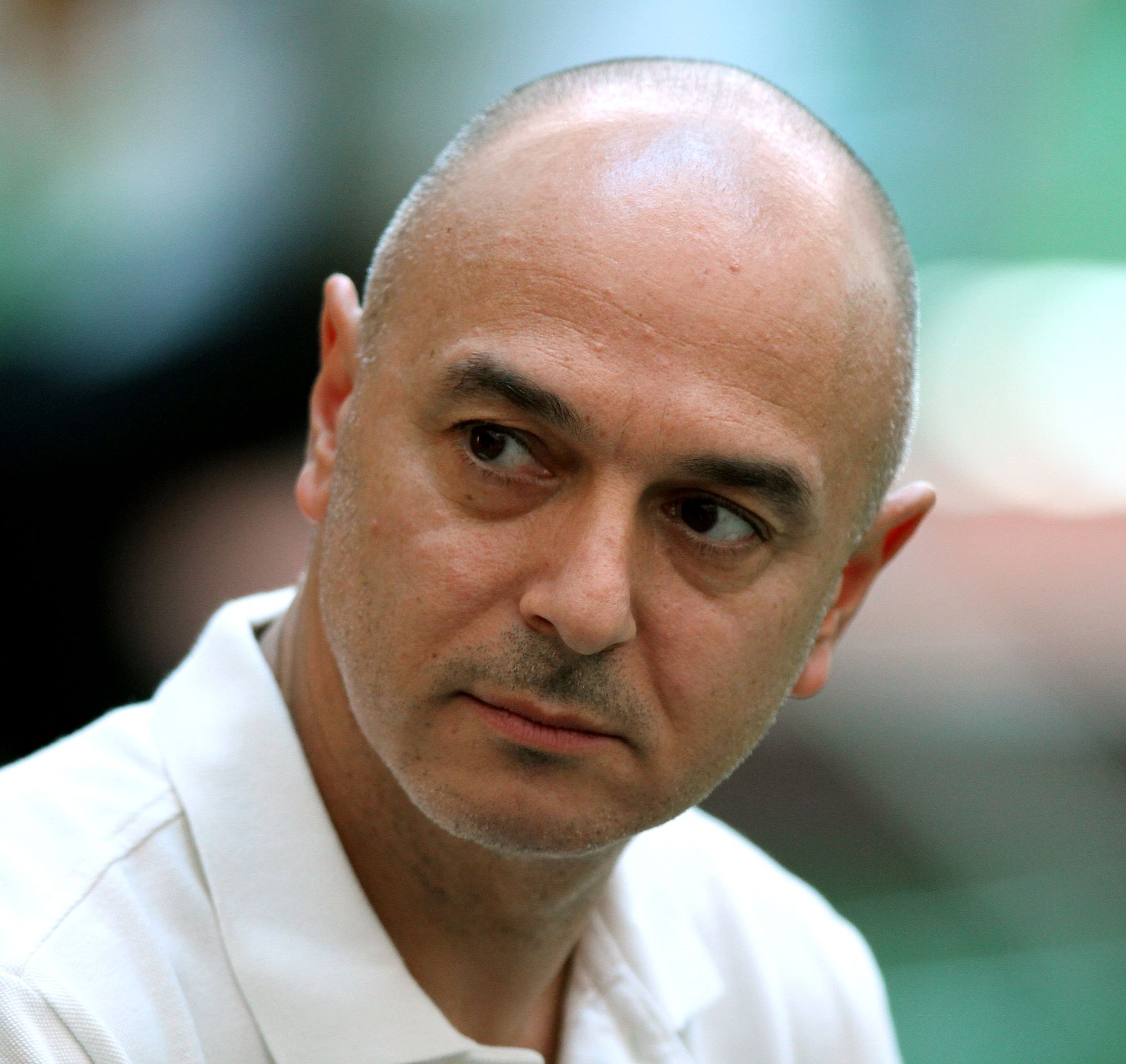
Image provided by Doha Stadium Plus Qatar
Image provided by Doha Stadium Plus Qatar
From those at the protest it was difficult to get a clear answer as to the ENIC Out movement's dream owner for Tottenham Hotspur Football Club.
But the general consensus from those we spoke with was "anyone but ENIC" and "an owner that would spend more money than ENIC."
With that in mind, the ENIC Out movement may be forced to reckon not just with on-pitch concerns in the coming years but moral ones too.
Over the last two decades, nation-states have taken an interest in the game of football.
Companies funded by these nations have purchased teams such as Manchester City, PSG and Newcastle and used their unrivalled wealth to bring success to these clubs, countries with questionable human rights records have been accused of using the game to engage in a practice known as "sportswashing."
This, according to Greenpeace, is "the act of sponsoring a sports team or event in order to distract from bad practices elsewhere."
And the reality is, if Spurs were to be sold tomorrow, there is a large chance it would be, as recent trends suggest, to a nation-state arguably looking to distract from human rights abuses and questionable politics.
This is reflected in current reporting, with the Evening Standard suggesting Qatar has held an interest in purchasing the North London club.
And this is the central issue for many fans, including Chris Miller, who told us: “It is difficult to not be controversial here, but after ENIC there seem to be three paths.
“The vast majority of new owners we’ve seen in the Premier League, who have bought clubs of a similar size to Tottenham, have been either state owners, often from places with terrible human rights records.
“Oligarchs, who have questionable means of extracting oil and making their billions.
“Or franchise owners who look to extract wealth from the club. So there are legitimate concerns as to what the alternative to ENIC might be.
"It is not like it used to be where if you were a millionaire you could afford to buy your favourite football club and run it like a fan. That is simply not possible, mostly due to the money currently in the Premier League.”
At present, the ENIC Out movement and its largest proponents online have seemingly chosen to ignore concerns over new ownership rather than address them.
But, if ENIC Out ever wants to transform into a mass movement as groups like Change For Tottenham hope, it must have workable solutions to these questions that the general fanbase can agree on.

Finally, the ENIC Out movement has faced accusations of anti-Semitism in recent months due to coded language directed at Daniel Levy.
As mentioned earlier, one man at the ENIC Out protest described Levy as a "parasite" and this language has been echoed online.
Levy was born in Essex, to Jewish parents and has supported Tottenham since he was a boy.
The word parasite associated with Judaism clearly has historical connotations that even the most passionate ENIC Out members would not want to be associated with.
This, combined with a media narrative that some claim falsely portrays Levy as a man unwilling to spend money, echoes anti-Semitic tropes made by reactionary right-wing movements throughout history.
This is not to suggest supporters of ENIC Out are anti-Semites, in fact, many Tottenham supporters are Jewish themselves.
But the use of this coded language and problematic accusations may cast the movement in a light that many fans would not like to be associated with, thus adding to the changes ENIC Out must undergo if it wishes to become a true movement for positive change at Tottenham.
Chris Miller explained to us: "I think a lot of the things we see are not deliberate, I don’t think everyone knows that Daniel Levy is Jewish.
“And the way that modern football fans think the only way to have any success is by spending vast amounts of money has led to an endless desire to spend more and more and more.
“When that doesn’t happen, people will criticise the lack of spending.
“However, I have at times pointed out on Twitter that the use of the word parasite about a Jewish man, regardless of whether you think his impact is parasitic, is tapping into an anti-semitic trope.”
Chris added that the response he has received online from ENIC Out advocates has been less than positive.
“I think once you’ve been told about the trope if you continue to use it, then you are being anti-Semitic in my opinion," he said.
“And it’s clear, whether deliberate or not, a lot of the vitriolic abuse that Daniel Levy gets is bordering on anti-Semitic and I would have a lot more respect for the movement if key stakeholders distanced themselves from anti-Semitic tropes.”
If the movement is to be embraced by the wider footballing world, it must reckon with the more reactionary elements in its ranks and examine its use of language, be it deliberate or not.

Conclusions
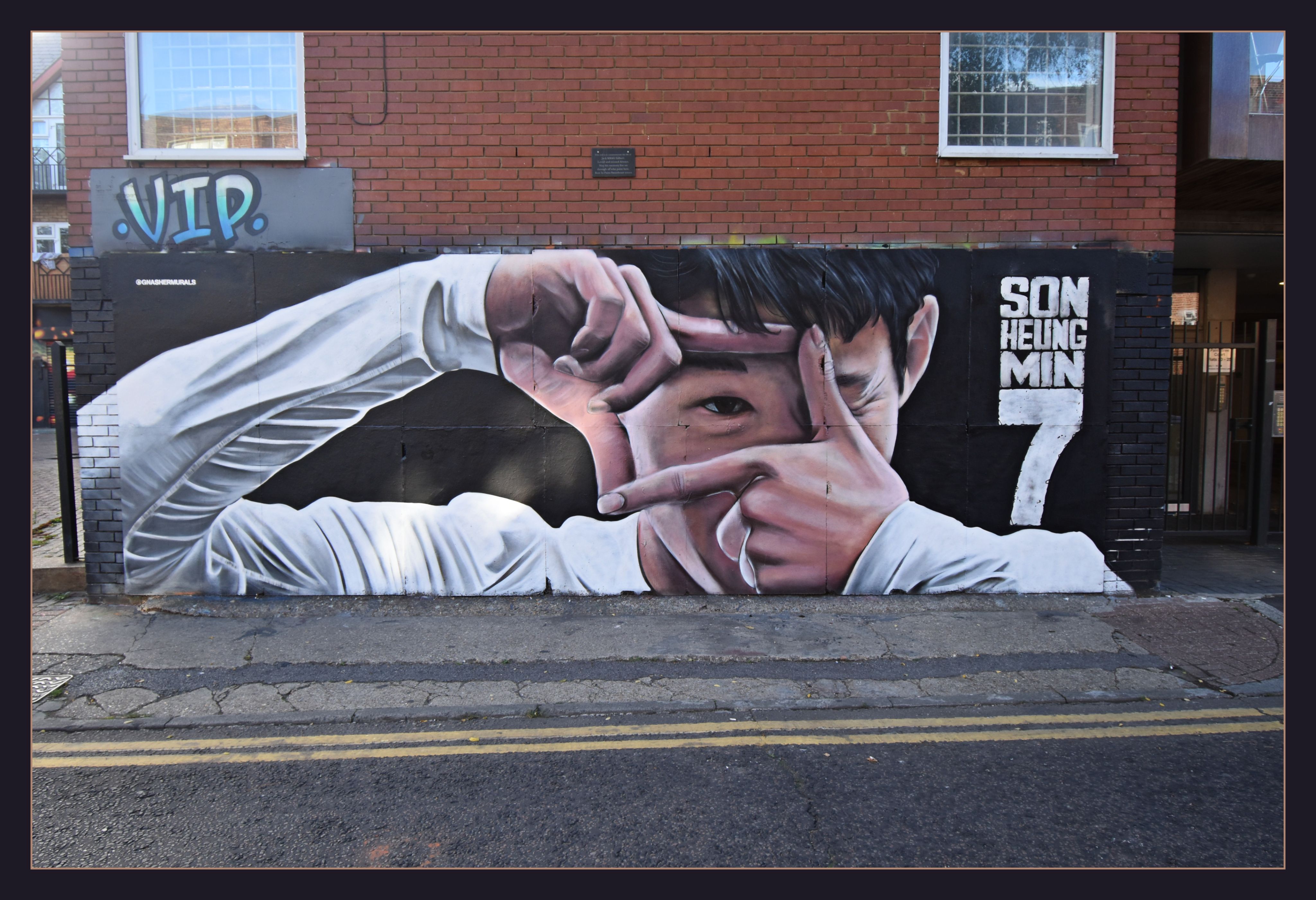
ENIC Out is a protest movement in its early stages and it must evolve if it wants to achieve its goals and mobilise the wider fanbase.
The movement faces questions over its ultimate aims that it, at present, is unable or unwilling to provide concrete answers on.
Groups such as Change For Tottenham have done a reasonable job at outlining key changes fans want to see but are yet to mobilise large swathes of supporters.
Moreover, many of the more extreme corners of the movement in many ways mirror reactionary politics, pushing neutral supporters away from the cause.
However, there is, undoubtedly a sense that things must change at Tottenham.
Be that through the sale of the club as the ENIC Out movement wishes, or through internal restructuring, Tottenham is facing a period of upheaval unseen since the early 2000s.
The results of this upheaval remain unknown, but the ENIC Out movement is sure to continue to push for its ultimate goal in the years to come.
